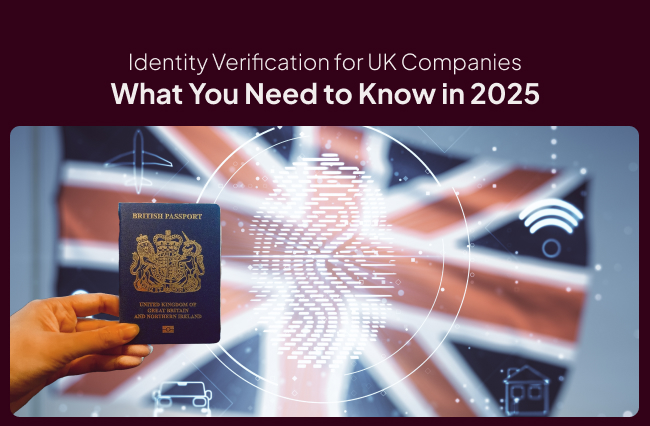The UK is ushering in a new age of business accountability and transparency with the rollout of the Economic Crime and Corporate Transparency Act 2023. At the heart of this reform is a mandatory identity verification requirement for key individuals involved in UK companies and limited liability partnerships (LLPs). Whether you are a director, a shareholder, a person with significant control (PSC), or even an accountant assisting with filings, you will now be required to prove your identity to Companies House.
This isn’t just an administrative tweak. It’s a significant step toward combating fraud, curbing the misuse of UK corporate structures, and enhancing trust in the UK’s corporate registry. In this guide, we will walk you through the who, what, when, and how of these new requirements so you can prepare and protect your company’s future. Staying ahead of these changes is essential for maintaining compliance and avoiding potential legal pitfalls. With deadlines approaching, understanding the process is no longer optional; it’s a business necessity.
Why Identity Verification Matters?
In recent years, UK authorities have struggled to address the growing misuse of companies for illicit purposes, including the creation of fake directorships, hidden ownership structures, and shell entities used for fraud and money laundering. Identity verification aims to fix these vulnerabilities by ensuring that only real, identifiable individuals can:
- Form companies or LLPs
- Act as directors or PSCs
- Submit filings to Companies House
This level of transparency will boost confidence in the UK’s business ecosystem, making it safer and more credible for both domestic and international investors. It also reinforces the UK’s position as a secure and reputable jurisdiction for legitimate business activities. As the new regulatory framework takes hold, compliance will become a vital part of maintaining corporate integrity.
Who Needs to Verify Their Identity?
The identity verification mandate applies broadly to those exercising control or authority in a UK-registered business. This includes:
- Company directors and secretaries
- People with Significant Control (PSCs)
- LLP members or partners
- Authorized Corporate Service Providers (ACSPs)
- Anyone filing documents to Companies House (such as accountants or legal representatives)
If you are involved in forming, managing, or submitting documents for a UK company, you must verify your identity. This ensures that all individuals influencing or administering company affairs are legitimate and accountable. Non-compliance may result in delays or penalties, making early verification crucial for smooth operations.
Timeline, When Does Verification Become Mandatory?
Although the law is now in effect, the implementation is being phased in to give stakeholders time to adapt:
- April 8, 2025: Voluntary identity verification begins via GOV.UK (One Login).
- Autumn 2025: Verification becomes mandatory for all new incorporations and appointments.
- Spring 2026: Only verified individuals or ACSPs will be able to submit filings to Companies House.
This timeline provides businesses with the opportunity to stay ahead of the deadline, which is particularly useful for those managing multiple companies or acting on behalf of others. Early compliance not only avoids last-minute hurdles but also demonstrates a proactive commitment to corporate transparency and regulatory alignment.
How to Verify Your Identity?
There are three official ways to verify your identity, each catering to different circumstances:
-
Online via GOV.UK One Login (Free)
This is the fastest and most accessible route for most individuals. Verification is done using the GOV.UK One Login app or website. Acceptable documents include:
- A biometric passport (from any country)
- A UK driving licence
- A Biometric Residence Permit (BRP)
- A BRC or Frontier Worker Permit
If you don’t have a photo ID, you may need to provide proof of address (e.g. a bank statement). Once verified, you will receive a unique personal code, which will be used to confirm your status when making filings. This code ensures your identity remains traceable and secure across all interactions with Companies House. The process typically takes only a few minutes if the necessary documents are readily available.
-
In Person at a UK Post Office (Free)
If online verification is not possible for you, then UK residents can verify their identity in person. This method still requires using GOV. The UK’s One Login service will begin the process. Once your information is submitted online, you will be directed to visit a designated Post Office branch to complete the identity check. You must bring your original identity documents, and a staff member will verify your details in person.
-
Via an Authorized Corporate Service Provider (ACSP)
Professionals like solicitors, accountants, or formation agents (who are AML-supervised) can verify your identity. This is often the best option for:
- Foreign directors/shareholders
- Businesses appointing multiple individuals at once
- Those unfamiliar with the online process
ACSPs may charge a fee for their services. They also ensure that your verification meets the legal standards and can assist with other incorporation and compliance procedures simultaneously. Choosing a reliable ACSP adds convenience and peace of mind, especially for overseas clients.
What Happens After Verification?
You will be issued a Companies House personal code, also called a Unique Identifier. This is not company-specific; it’s tied to you as an individual and must be used when:
- You are being appointed as a director or PSC
- You are submitting confirmation statements or other filings
- You are registering as an ACSP
It is crucial to maintain the security of this code. The code should only be shared with trusted entities, such as your accountant or authorised business representative. This Unique Identifier plays a central role in the identity verification for UK companies, serving as proof of compliance with the 2025 regulatory changes. Keep it safe and readily accessible for future filings and administrative tasks.
Consequences of Not Verifying
Failure to verify your identity by the relevant deadlines has serious consequences. If you haven’t verified:
- You cannot be appointed to a company role
- You will be barred from making filings
- You could face criminal charges or fines
- Existing appointments may be invalidated
- Directors may be disqualified
These penalties apply both to individuals and businesses that fail to comply. Avoid last-minute stress; act during the voluntary phase to ensure compliance.
Identity Verification in Action: How It Prevents Fraud?
Before this reform, it was alarmingly easy for someone to falsely list you as a director or PSC. Such impersonations could result in:
- Being legally responsible for debts
- Having your name associated with illicit activities
- Losing access to legitimate corporate functions
Identity verification closes this loophole. It ensures only verified individuals can act within UK companies, providing peace of mind for stakeholders and raising the bar for corporate integrity.
How OAEC Helps with Identity Verification?
We understand how daunting it can be to navigate regulatory changes, especially when they involve new technology, official filings, and cross-border complexities.
We offer:
- End-to-end identity verification support via GOV.UK or through our approved ACSP partners
- Company formation services that include immediate verification for directors and PSCs
- Ongoing compliance assistance to help with filing, confirmation statements, and governance
- Assistance for foreign directors or partners requiring remote verification options
Conclusion
As the UK modernises its corporate governance framework through the Economic Crime and Corporate Transparency Act 2023, identity verification has become a cornerstone of business integrity and trust. This reform isn’t just about fulfilling a checkbox; it’s a significant step toward a more secure, transparent, and fraud-resistant corporate environment. If you are a business owner, director, shareholder, or someone with significant control (PSC) in a UK-registered company, this law directly impacts you. Waiting until the last moment to verify your identity can expose you to unnecessary risk, administrative delays, or even legal penalties. With mandatory deadlines approaching in 2025 and 2026, now is the time to:
- Understand your obligation
- Choose the proper verification method (online, Post Office, or through a trusted ACSP)
- Begin the verification process early, especially if you manage multiple entities or serve in different roles.
- Ensure your documentation (ID, proof of address, etc.) is up to date
- Safely store your Companies House personal code (Unique Identifier) for future filings and correspondence
For international business owners, expatriates, or those managing companies remotely, working with an authorised agent (like an ACSP) offers peace of mind, guidance, and assurance of compliance. If you’re unsure where to begin, we can assist with company formation, registered addresses, identity verification, and ongoing support. Ultimately, this legislation is designed to protect the UK’s business landscape, reducing impersonation, shell company misuse, and economic crime, while reinforcing the UK’s standing as a reliable and credible place to do business. Acting today is the most innovative way to future-proof your company, maintain control over your business reputation, and ensure smooth operation under the evolving corporate regulations.



